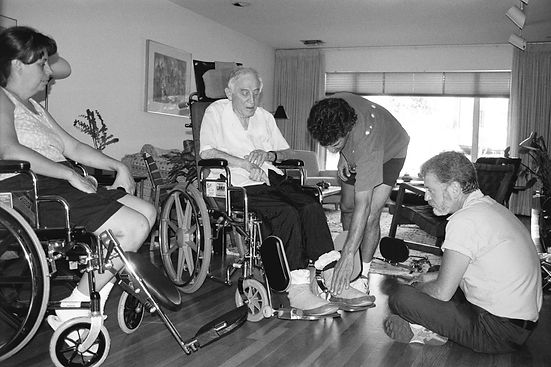
Morrie could shave one side of his face but due to deterioration of his muscles from ALS, he needed help for the other side.
Morrie felt it was important to have independence and did the tasks he could do for as long as possible.

Morrie's son Jonathan spent quality time and many tender moments with his father.


Morrie was open-minded about all cultures and paths to healing.

Acupuncturist Jean Ann helps Morrie manage pain by inserting thin needles into strategic points of his body.
At that point in my career, photographing Morrie was quite a departure from chronicling single mothers living on federal assistance - I called the mothers to arrange visits. They didn’t display photos I made of them. By contrast, Morrie was calling me! He was engaging and funny. While in his room, poised with my camera, I tried to never interfere, but rather to witness and chronicle his interactions with friends and family.
I was aware that there were a lot of people coming through the Schwartz home: in addition to family and friends, there were many home health aides, the Nightline camera crew, plus Morrie’s former student Mitch Albom started coming on Tuesdays. The easiest person to ask to step aside to make more room would be me. This is probably why I never even thought about taking a selfie with Morrie. (This was before cell phones and the ubiquitousness of selfies -- but that’s the word I need here -- a self-taken photograph of me with Morrie.)
In those times I was alone with Morrie, he had the selflessness and compassion to ask me about my family, my friends, my love life. Although I tried to be invisible, Morrie made me feel seen. These private conversations with Morrie being present and attentive were a ‘present’ to me.
Morrie told me about his mother dying when he was very young and how it had affected him. Morrie and I were in the room next to where the TV was when the OJ Simpson’s verdict was announced. We talked about it briefly and Morrie had expected that verdict. Morrie had said that we either learn to “love each other or perish.” I remember thinking that seems a bit extreme. But, he was right. We either learn to fear each other, the different and unfamiliar, or we find the courage to learn to love.
I made sure to hold up my end of our deal by installing an exhibition at Brandeis in September 1995. By then, Morrie was working on his book, “Letting Go” and was losing energy. He was physically unable to leave his home and attend, but his spirit filled the exhibition space with love.
Morrie requested that this statement be a part of the exhibition:
* There are no photographs of Morrie’s wife who has been involved in every aspect of his care, providing great comfort, love and support to him. They wished to share these times only between themselves.
Morrie died November 4, 1995. My advocate and collaborator was gone. That day was grey and cold as the inevitable winter season set in. I took a walk at my favorite place, Walden Pond where Henry David Thoreau’s words are carved on a wooden plaque:
“I went to the woods because I wished to live deliberately, to front only the essential facts of life, and see if I could not learn what it had to teach, and not, when I came to die, discover that I had not lived.”
Since Morrie’s death, my pictures of him have been in publications and television both nationally and internationally. Some images have won awards. They have not been exhibited as a whole since 1995. Now, it's over 25 years since Morrie's passing. Morrie said he thought people lived on in the minds of family and friends for another 25 years and then memories start to fade. I’m gratified that Mitch Albom, in this book ‘Tuesdays with Morrie’ has allowed Morrie’s wisdom to live on as there is still much we all can learn.
After 25 years of living and teaching overseas, I am repatriated back to my home in Massachusetts. I decided to revisit the negatives of my photo sessions with Morrie. Reviewing them in slow, deliberate detail, I’ve been reminded about how to live, and die, with dignity. I, for one, am learning everyday how to live with courage and love.
In late November 1995, Rob and I visit Morrie's grave marker to pay respects and send love.

Home health aide Siobhan helps Morrie with some sustenance. Morrie felt that grieving for the loss of physical function is necessary; and to balance that with cherishing the life still left.


Morrie enjoys having his hair washed by Connie, a home health aide, with an assist from his friend Debbie.
Morrie called his friends, Phyllis and Debbie, his 'angels.' Their visits always made him feel better.




Narayan, Morrie's meditation teacher suggested that the leap between life and death may not be a wide chasm, but instead - maybe there is a little bridge.

Human touch is a powerful healer that lowers cortisol, a stress hormone, resulting in a sense of relaxation and peace.

Over half of wheelchairs break in any given six month period and getting parts to fix them is difficult. Morrie's friends and caregivers help to fix this essential piece of equipment.
Morrie has friends gather at his home before a group discussion on 'Death & Spirituality."



